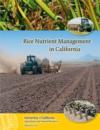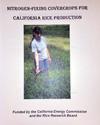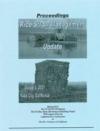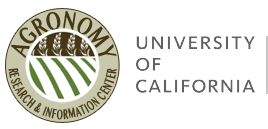Rice Production

Rice Nutrient Management in California (purchase from ANR)
With fertilizer prices on the rise, the need for careful nutrient management is greater than ever. This guide walks you through the steps needed to analyze your situation so you can make informed decisions for your rice crop.

Cultivated Wild Rice Production in California (purchase from ANR)
This publication contains key information for growers on every aspect of cultivated wild rice production from varieties, basin construction, and planting to harvesting, processing, and marketing. Also includes chapters on weed, insect, bird, and disease management. Important consideration is also given to seed and water management and the chemistry of flooded soils.

Rice Irrigation Systems for Tailwater Management (courtesy of ANR)
State law requires that rice growers impound pesticide-treated irrigation water until the pesticides have broken down into nontoxic chemicals. This book compares three alternatives for recirculating or retaining water.

Nitrogen-Fixing Covercrops for California Rice Production, G.S. Pettygrove and J.F. Williams (1996). The purpose of this bulletin is to describe benefits and limitations of covercropping in rice rotations and the appropriate cultural practices.

California Rice Production, Loren L. Davis (April, 1950) (via HathiTrust.org)
Commercial rice growing in California started in 1912 after it was determined that climatic and soil conditions were suitable for the production of early to midstream maturing rices of the Japanese varieties.
Pest Management

Integrated Pest Management for Rice-3rd Ed (purchase from ANR)
A practical guide for managing pests. Includes charts, tables, illustrations, and color photographs. From the UC Statewide IPM Project.

Rice: UC Integrated Pest Management Guidelines
Research-based recommendations to manage arthropods, diseases and weeds in California rice.
Grain Quality

Rice Quality Handbook (currently unavailable for purchase)
This manual provides a step-by-step guide to producing high-quality rice from planting to postharvest. While written with the Sacramento Valley of California in mind, growers, buyers, and operators of dryers, warehouses, and processing operations worldwide will benefit from this handbook. Illustrated with 39 color photographs, 58 graphs, and 35 line drawings. An English-metric conversion chart and an index round out this essential manual.
Rice Straw

Rice Straw for Use in Dairy Heifer Rations (download from ANR)
With feed prices rising, dairies are looking for new feed options such as rice straw. The problem is rice straw can jam equipment and be hard to mix into other ration components. The key is to cut the straw to the right length at the cutter/baler stage.

Feeding Rice Straw to Cattle (download from ANR)
Rice straw, under increased scrutiny when burned as agricultural waste, has new promise as a livestock feed.

Rice Producers' Guide to Marketing Rice Straw (download from ANR)
The burning of rice straw as agricultural waste is under increasing scrutiny, but growers have to get rid of the stuff somehow. Here are a number of alternative uses for rice straw that can transform it from a liability to an income-producing asset.

Rice Straw Management Update (PDF)
Proceedings, UC Rice Straw Management Conference (2001)
Economics
- 2007 Sample Costs to Produce Rice, Delta Region of San Joaquin & Sacramento Counties, Continuous Rice Culture
- 2007 Sample Costs to Produce Rice, Delta Region of San Joaquin & Sacramento Counties, Two Year Crop Rotation
- 2012 Sample Costs to Produce Rice, Sacramento Valley, Rice Only Rotation, Medium Grain
